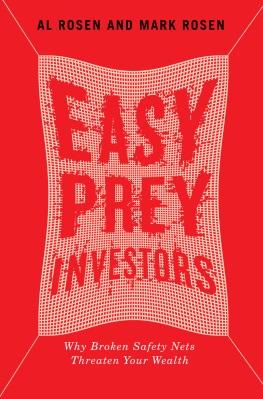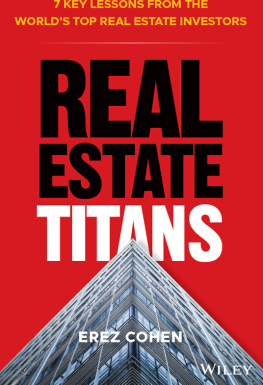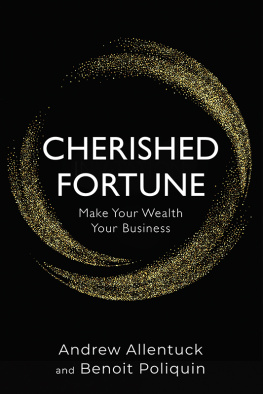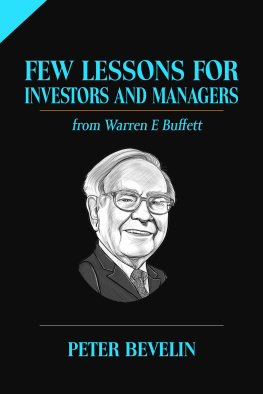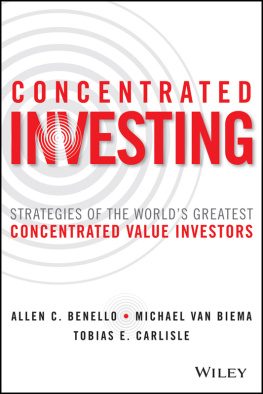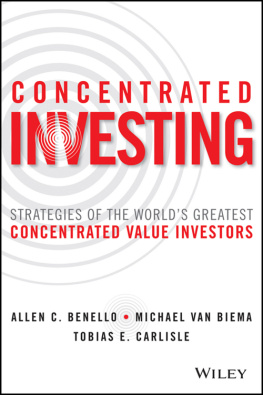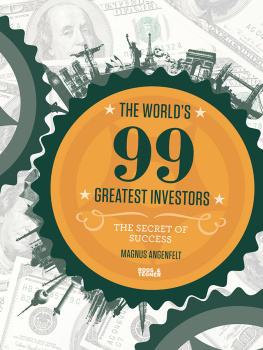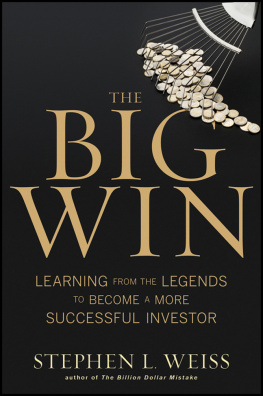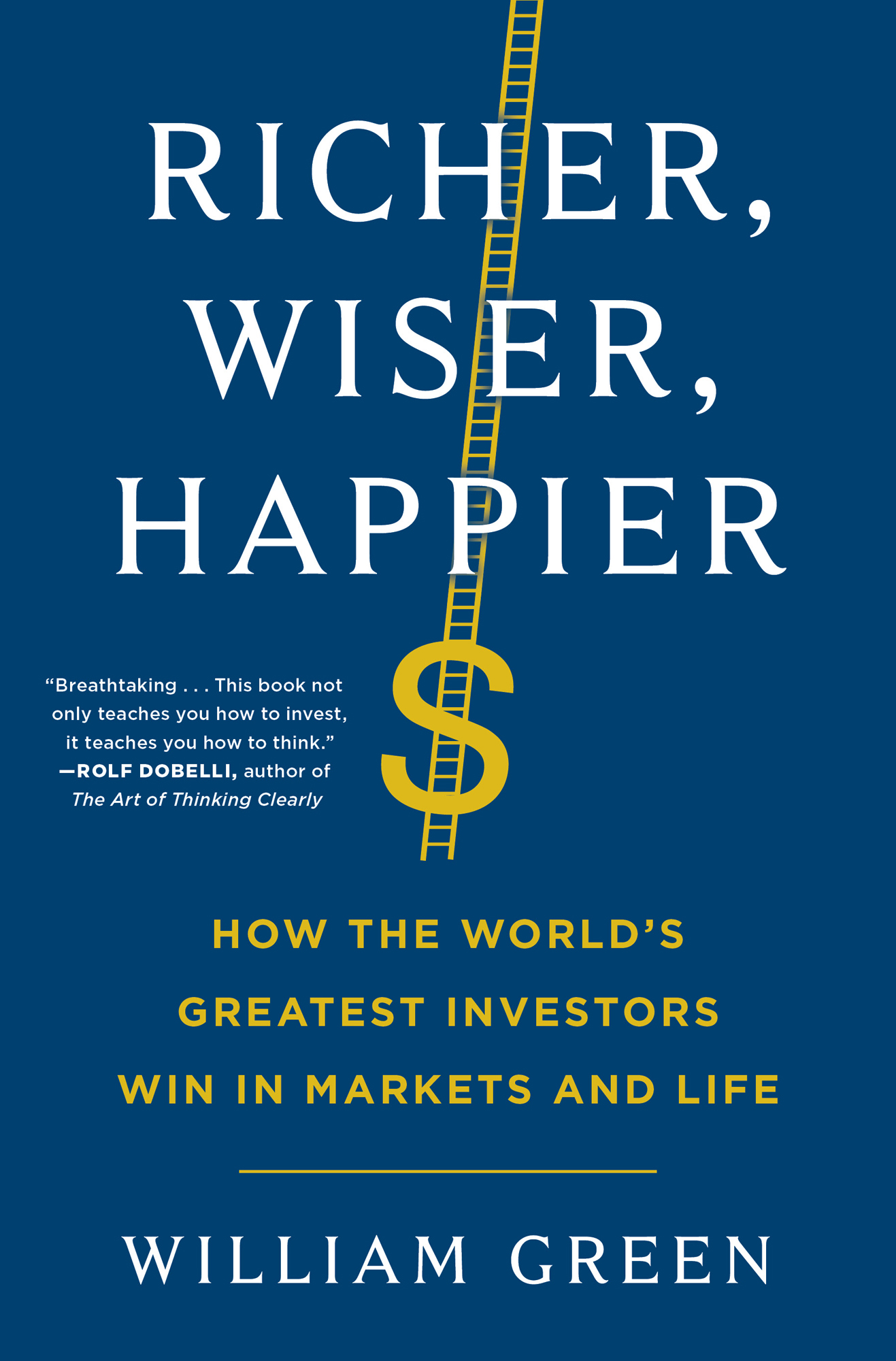
Richer, Wiser, Happier
Breathtaking This book not only teaches you how to invest, it teaches you how to think.
Rolf Dobelli, author of The Art of Thinking Clearly
How the Worlds Greatest Investors Win in Markets and Life
William Green
More Praise for RICHER, WISER, HAPPIER
Endlessly fascinating Richer, Wiser, Happier is going to be a classic.
Guy Spier, CEO of Aquamarine Capital and author of The Education of a Value Investor
Wonderful a profound, eloquent, and much-needed call for a reassessment of how we build our portfolios and live our lives.
Stig Brodersen, cofounder of The Investors Podcast Network and host of the podcast We Study Billionaires
Highly recommended a thoroughly engaging book that is brimming with unique insights into investing and life.
John Mihaljevic, chairman of MOI Global and author of The Manual of Ideas
Invaluable destined to become a timeless classic on lifelong learning, self-improvement, and becoming the best version of ourselves.
Gautam Baid, author of The Joys of Compounding
Edifying William Green draws on history, philosophy, and spirituality to present a meditation on investing. Far more than a book about stock picking, Richer, Wiser, Happier is the enlightened investors guide to life.
Nina Munk, author of The Idealist and Fools Rush In
Fantastic accomplishes what few books ever have, which is to show how to be rational.
Saurabh Madaan, deputy chief investment officer at Markel Corporation and former senior data scientist at Google
For Lauren, Henry, Madeleine, and Marilyn
INTRODUCTION Inside the Minds of the Greatest Investors
Ive been obsessed with investing for a quarter of a century. At first, it seemed an unlikely passion. I had never taken a class in business or economics. I had no talent for numbers and no grasp of the esoteric mysteries of accounting. After leaving Oxford with a degree in English literature, I reviewed novels for magazines and wrote profiles of fraudsters and murderers. As an aspiring author with high-minded dreams of literary fame, I found it easy to dismiss Wall Street as a casino full of crass speculators who cared only about money. When the New York Times landed on my doorstep, I would jettison the business section without even glancing at it.
But in 1995, I found myself with a bit of cash to investmy half of the proceeds from the sale of an apartment that I owned with my brother. I began to read incessantly about stocks and funds, eager to increase my modest windfall. This reawakened in me a gambling streak that had briefly run wild when I was a teenager in England in the 1980s. At fifteen, when I was a student at Eton, Id sneak out of school on lazy summer afternoons and spend hours at a local turf accountant near Windsor Castle, betting on horses while my classmates played cricket or went rowing. I was meant to become a posh English gentleman like Boris Johnson, Prince William, and six centuries of Etonians before us. Instead, I had an illegal betting account under the name of Mike Smith.
My interest in horse racing was fueled not by the romance of the sport or the majesty of the equine form, but by a desire to make money without working. I took it seriously, jotting down elaborate notes about horses and courses, using multicolored ink pens to highlight my wins and losses. I ruined my sixteenth birthday by fighting with my parents over their refusal to buy me a subscription to Timeform, a pricey system for rating horses. I was outraged that they blocked this obvious route to untold riches. Shortly afterward, following a string of disillusioning losses, I renounced racing once and for all.
A decade later, when I began to read about investing, I discovered that the stock market offered similar thrills. But the odds of success were much higher. Stocks struck me as the perfect way to cash in merely by outthinking other people. Of course, I had no idea what I was doing. But I had one inestimable advantage. As a journalist, I could indulge my new fixation by interviewing many of the best investors in the business.
In the years that followed, I interviewed a pantheon of investment legends for Forbes, Money, Fortune, and Time, returning again and again to the same overarching questions that fascinate me to this day: What principles, processes, insights, habits, and personality traits enable this tiny minority to beat the market in the long run and become spectacularly rich? More important, how can you and I profit by studying these financial outliers and reverse engineering their winning ways? Those questions lie at the heart of this book.
To my delight, many of the investors I encountered were fascinating and oddly exotic. I flew to the Bahamas to spend a day with Sir John Templeton, the greatest global stock picker of the twentieth century, who lived in a Caribbean idyll called Lyford Cay. I traveled to Houston for an audience with Fayez Sarofim, an enigmatic Egyptian billionaire nicknamed the Sphinx. In his office, he displayed paintings by El Greco and Willem de Kooning, along with a fifth-century mosaic floor imported from a Syrian church. I spoke with Mark Mobius (the Bald Eagle), who flew around the developing world in a Gulfstream jet adorned with gold-plated fixtures and iguana-skin upholstery, purchased from a Middle Eastern tycoon who had fallen on hard times. I interviewed Michael Price, a polo-playing centimillionaire who terrorized underperforming CEOs and came to be known as the scariest SOB on Wall Street. I met Helmut Friedlaender, who had fled from Germany in the 1930s, stopping only to pick up his teenage sister and buy a hat because a gentleman does not travel without a hat. He drank Chteau Ptrus, collected precious medieval books, and traded everything from coffee futures to the Empire State Building. In his nineties, he told me, I have lived uproariously.
It was a priceless education. Jack Bogle, the index fund icon who founded Vanguard, which now manages $6.2 trillion, talked to me about the formative investment lessons hed learned from his mentor and hero, a mutual fund pioneer named Walter Morgan: Dont get carried away. Dont take excessive risk. Keep your costs low. And: The crowd is always wrong. As we shall see, Bogle also explained why you dont need to be great to thrive as an investor.
Peter Lynch, Fidelitys most famous fund manager, talked to me about how hed won by outworking everybody else. But he also spoke about the wild unpredictability of markets and the need for humility: You get a lot of As and Bs in school. In the stock market, you get a lot of Fs. And if youre right six or seven times out of ten, youre very good. Lynch recalled one of his first failures: a high-flying apparel business went bust all because of the movie Bonnie and Clyde, which altered womens fashions so unexpectedly that the companys inventory became worthless. Ned Johnson, the multibillionaire who built Fidelity into a behemoth, laughed and told Lynch, You did everything right. Things come out of left field every now and then.
In the tumultuous days after 9/11, when financial markets were suffering their worst week since the Great Depression, I headed to Baltimore to visit Bill Miller, who was in the midst of an unprecedented streak of beating the S&P 500 index for fifteen years running. We spent a few days together and traveled in his Learjet, which hed bought in part so that his 110-pound Irish wolfhound could fly with him. The economy was reeling, war was brewing in Afghanistan, and his fund had tumbled 40 percent from its peak. But Miller was relaxed and cheerful, coolly staking hundreds of millions of dollars on beaten-down stocks that subsequently soared.


